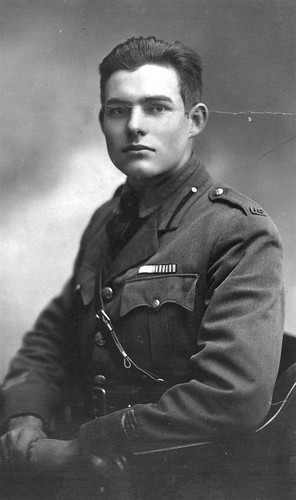The book is set in WWI Italy where the main character, Frederic Henry, is an American lieutenant serving with the Italians and leading a group of ambulances taking injured men back from the front. He has a charming wit and makes many friends near the beginning of the book and begins to use that charm on an English girl named Catherine who is a nurse. They begin a coy sort of romance just behind the front between Italy and Austria.
Then Henry or Tenente as he is called in the book is sent to the front and his leg gets badly wounded by shrapnel from an artillery explosion. He then gets sent back to Milan to a hospital and Catherine is sent there as a nurse. They fall deeply in love and are constantly drinking - to the point where he becomes jaundiced. It's the sort of drinking that sounds very romantic - different Italian wines and brandies and vermouth in cafes and ristorantes. But its all the time throughout the book. They find out that Catherine is pregnant just before he is sent back to the front. While up there, a massive retreat is ordered for the Italians. While he is retreating with his men many bad things happen and he is separated from all but a few. While they are crossing a bridge into a city while marching with hundreds of other soldiers he notices that all the officers are being taken to the side and "questioned." It turns out that people don't like the idea of a retreat and are forming a new army and killing all the officers. Henry escapes by jumping into the river and then gets on a train and hides. He makes it back to Milan to find out that Catherine is in a small village near the border of Switzerland and Italy. He goes there and before he is arrested they both escape in a rowboat across a lake into Switzerland. She is drinking with him and helping row the boat.
They make it to Switzerland and are living happily, deeply in love, continuing to drink fancy wine and have a romantic life until it comes time to have the baby. They head to the hospital where she excessively takes the "gas" for pain. The doctor declares that she must have a c-section after her blood pressure drops drastically (remember this is WWI).
The baby is delivered dead and shortly thereafter Catherine dies. The End.
AAAAGGGGGHHHHHHH!!!!!!!!!!!
This book was superbly written and it was so fun to listen in on the playful conversations between Henry and Catherine. Henry overcomes so many difficulties - being at the front of WWI, getting a huge leg injury, going back to the front, escaping assassination, finding his love, rowing 28 km across a lake at night in the rain to escape, AND THEN THE GIRL AND THE BABY DIE!!
AAAAAAAGGGGGGHHHHHHHHH!!!!!!!!!!!!!
It was so frustrating. It turns out that Hemingway was a huge drinker, served in WWI, and ended up committing suicide later in life.
It's so sad that people will throw away brilliant gifts and beautiful relationships for the love of alcohol and self.
Great book, but like many other great books, very frustrating. This is a picture of Ernest Hemingway in Milan in 1918.




3 comments:
Sad story, but I am happy to see you breaking away from those lame science fiction and settling into a good classic/romance novel. :). You're so sensitive Eric.
And I'm pretty sure they made a movie after Ernest Hemingway's life/this book. Sandra Bullock and that hot guy was in it. I cried my eyes out!
Thank you Melissa for being the only one to comment on my literary post.
Yes, but remember the REAL story behind this book. His relationship with Red Cross nurse Agnes Von Kurowsky. She destroyed him so I can see him killing her in the book. LOL
You should read, 'Hemingway In Love and War - The Lost Diary Of Agnes Von Kurowsky' by Henry S. Villard and James Nagel It makes this book make much more sense.
Post a Comment